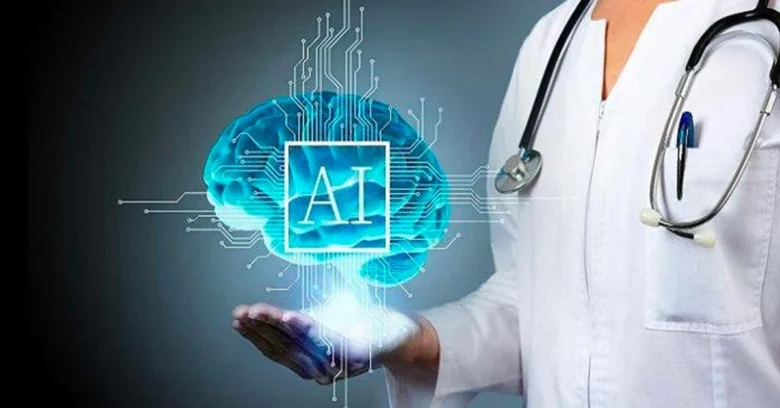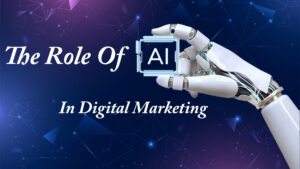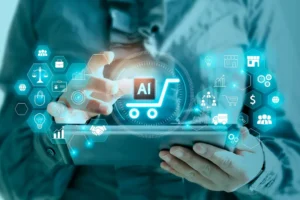Artificial intelligence is transforming areas such as healthcare. Artificial intelligence is changing the way doctors diagnose, treat and manage patients. This revolution is powered by artificial intelligence’s ability to analyze large amounts of data, find patterns and provide actionable insights. Artificial intelligence is transforming healthcare.
Improved Diagnostics:
Artificial intelligence improves diagnosis and has a major impact on healthcare. Traditional diagnosis takes time and is prone to errors. Machine learning algorithms and neural networks can quickly and accurately evaluate medical images, laboratory results and patient records. Radiologists use these techniques to find irregularities in X-rays, MRIs, and CT scans that people may miss. Artificial intelligence can process large data sets and discover subtle patterns to enable more accurate early diagnosis, improving patient outcomes.
Customized Treatment:
Artificial intelligence enables patient-specific treatment strategies. Artificial intelligence can predict response to treatment based on genetics, lifestyle and medical history. This tailored approach can help patients receive the most effective medications, reduce side effects and promote better health. Oncologists can use artificial intelligence algorithms to select the best chemotherapy regimen based on a cancer patient’s genetic profile, resulting in more targeted and successful treatments.
Predictive Analytics for Disease Prevention:
Modern healthcare depends on disease prevention. Predictive analytics using artificial intelligence identifies individuals at high risk for certain diseases. Artificial intelligence can reveal trends and risk factors for diabetes, heart disease and cancer by analyzing data from electronic health records, wearable devices and other sources. This knowledge can help doctors preventing disease through lifestyle changes and screening.
Simplify Management:
Healthcare institutions are sometimes confronted with administrative problems that hinder patient care. Artificial intelligence streamlines these processes, reducing the burden on healthcare workers and increasing efficiency. AI-powered chatbots and virtual assistants can schedule appointments, answer patient questions, and process insurance claims. Automation allows healthcare providers to focus on more important tasks, improving patient care and satisfaction.
Better Patient Monitoring:
Artificial intelligence is transforming patient monitoring, especially chronic disease monitoring. AI-based wearable devices and remote monitoring systems can measure patients’ vital signs, activity, and other health parameters. These sensors can immediately detect abnormalities and alert healthcare providers before the condition worsens. Continuous monitoring ensures timely intervention, reduces readmissions and improves patients’ quality of life.
Drug Development and Discovery:
Drug development takes a long time and is expensive. Artificial intelligence accelerates this process by analyzing large databases to find drug candidates and predict efficacy. Machine learning algorithms can discover potential compounds for further research based on molecular data, clinical trial results and academic literature. This approach accelerates drug development and reduces costs, making treatments more affordable.
Strengthen Medical Research:
Artificial intelligence is crucial for medical research. Researchers can use artificial intelligence to discover trends and hypotheses and evaluate large data sets. Artificial intelligence’s ability to understand complex data sets it apart from traditional research. Artificial intelligence can analyze genetic data to reveal disease genetics and find new treatments. AI-driven simulations can simulate disease development and treatment outcomes to support clinical trials and research.
Virtual Health Assistant:
Artificial intelligence-powered virtual health assistants are transforming patient care. Patients can receive personalized health information, prescription reminders and answers to medical questions from these assistants. Natural language processing allows virtual health assistants to meaningfully communicate with patients and help them manage their health problems. The technology improves patient engagement, treatment compliance and health monitoring.
Robotic Surgery:
AI-powered robotic surgery is transforming surgery by increasing precision and making it less invasive. Robotic surgical systems, guided by artificial intelligence algorithms, can perform difficult operations with unparalleled precision. By controlling these technologies distally, the surgeon gets immediate input and a better view. Robotic surgery reduces recovery time, tissue damage and human error. AI-powered robotic surgery is revolutionizing medicine by reducing pain, scarring and recovery time.
Mental Health Help:
Artificial intelligence could also improve mental health treatment. AI-powered chatbots and virtual therapists provide mental health support and coping skills. These systems scan language and emotions to detect discomfort and intervene quickly. AI’s 24/7 support ensures people can get the care they need, even if they don’t have a therapist. This technology helps measure mental health needs and reduce stigma.
Strengthen Telemedicine:
Telemedicine continues to grow, especially during COVID-19. Artificial intelligence improves remote diagnosis and patient monitoring in telemedicine. During a virtual consultation, AI-powered diagnostic tools can analyze symptoms and medical history to make the right recommendations. By providing immediate insights and treatment ideas, AI systems can help healthcare providers make informed decisions. The technology connects healthcare providers with remote or underserved patients to deliver high-quality care.
Ethical and Regulatory Considerations:
The AI revolution in healthcare requires ethical and regulatory considerations. The privacy and security of patient data are of the utmost importance. AI in healthcare requires strong regulation to ensure openness, accountability and fairness. To reduce healthcare inequalities, biases in AI algorithms must be addressed. The healthcare industry can maximize the potential of artificial intelligence by proactively addressing ethical and regulatory issues, while protecting patients’ rights and promoting equitable care.
Conclusion:
Artificial intelligence in healthcare is revolutionizing patient care, process efficiency and medical research. Artificial intelligence is transforming healthcare through improved diagnostics, personalized treatment plans, predictive analytics and robotic surgery. As technology advances, AI’s ability to improve healthcare outcomes and accessibility will increase. The healthcare sector can combine modern technology with compassionate care by using artificial intelligence and addressing ethical issues.
FAQs:
1. How does artificial intelligence improve medical diagnosis?
Artificial intelligence uses machine learning algorithms and neural networks to analyze medical photos, laboratory results and patient information to improve diagnosis. These algorithms can detect abnormalities and patterns that people miss, improving patient outcomes by making more accurate and earlier diagnoses.
2. Will artificial intelligence influence customized treatment plans?
Artificial intelligence analyzes genetics, lifestyle and medical history to predict response to treatment, which is critical for personalized treatment strategies. This allows doctors to tailor treatments to improve efficacy and reduce negative side effects.
3. How does artificial intelligence prevent diseases?
Artificial intelligence uses predictive analytics to prevent diseases. Artificial intelligence can identify high-risk individuals by evaluating data from electronic health records, wearable devices and other sources. This allows healthcare providers to prevent diseases through lifestyle changes and screening.
4. How can artificial intelligence improve patient monitoring?
Wearable devices and remote monitoring systems powered by artificial intelligence track vital signs, activity levels and other health indicators to improve patient monitoring. These gadgets can immediately notify medical personnel of abnormal situations, ensuring timely intervention and improving the quality of life of patients.
5. What are the ethical issues related to artificial intelligence in healthcare?
Applications of AI in healthcare ethics include protecting patient data, addressing biases in AI algorithms to reduce healthcare inequities, and developing strong transparency, accountability and legislation for equality. To maximize the benefits of artificial intelligence while protecting patients’ rights, these issues must be addressed.



